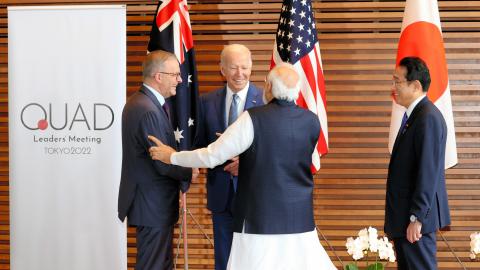President Biden’s cancellation of his trip to Australia has led to a chorus of criticism that the American president has let down the leaders of Australia, Japan and India. Biden was due to attend the leaders’ summit of the Quadrilateral Security Dialogue — known as “the Quad” — in Sydney. Others have argued that Biden’s absence presents a considerable public relations victory for China, allowing Beijing to highlight the physical frailty of the president and the division and chaos of Democrats and Republicans unable to work together in the national interest. This could cause other Asian nations to question American commitment and be forced to ready themselves for an era of American decline and Chinese pre-eminence.
It is likely Beijing will encourage doubts to grow about Biden’s vigor, his administration’s reliability vis-à-vis Asian allies and American material strength and staying power. After all, a president abandoning a major summit to negotiate with Congress to raise the debt ceiling and prevent default is terrible optics for the country. But winning the strategic contest is about much more than attending a summit. If turning up is the primary indicator of national strength and resolve, then China really would be in trouble: Chinese President Xi Jinping abandoned all international travel from February 2020 through September 2022. Yet China is clearly a major power and as formidable as it was before the pandemic.
Biden’s decision is a blow for his Australian host, Prime Minister Anthony Albanese. But don’t read too much into it. The U.S. has not lost its leadership, the Quad leaders will meet on the sidelines of the Group of Seven summit in Japan and Xi will not be breathing a sigh of relief.
From the perspective of competing with China, which is what much of the Quad is about, Biden’s decision to cut short his Asian trip to resolve the impending debt crisis is an understandable one. Beijing relies on encouraging the perception that American power is declining to persuade other nations that its dominance over Asia is all but assured. An American government default due to failure to raise the debt ceiling would cause immediate and terrible damage to the American economy, and the effects for the global economy would be severe. One could debate the extent to which Biden is to blame for the current impasse with the Republicans. But if America defaults, its power, prestige and global standing would suffer a catastrophic blow regardless of whether Biden flew to Sydney.
What about the abandoned Quad summit that was to be held in Sydney? What was due to be discussed in Sydney will now be raised in Hiroshima. Besides, the Quad is about much more than leaders of the four countries meeting in person periodically. Since the grouping was formally reinstituted in late 2017, political leaders, cabinet ministers, senior bureaucratic and military officials, and ambassadors gather as Quad members regularly to coordinate policies across areas including defense, health, finance, trade and investment, technology, and critical minerals.
While the optics of a leaders meeting is an important one to signal solidarity and camaraderie between the four nations, the real work behind the scenes goes on relentlessly. Almost all policies and agreements are negotiated and concluded before the meeting of leaders. It is this constant coordination between the four countries that causes China the greatest concern. The sudden change of plans by an American president does nothing to diminish that.
Biden’s decision to attend the G7 summit instead of the Quad meeting is the correct one. The strategic, economic and technological policies of the major European nations will go a long way in deciding the future global balance of material power. As host of the G7, Japan has also invited Australia, India, Brazil, Indonesia, South Korea, Vietnam, the Cook Islands, and Comoros (the latter two are the chairs of the Pacific Island Forum and the African Union, respectively).
These are the entities and nations that China is also seeking to seduce (or coerce). The Quad countries have already concluded they are in a comprehensive strategic competition with China and accept that they need to coordinate policies across many more areas. Some of the attendees at the G7 are more undecided when it comes to where they stand. For this reason, the symbolism of Biden being at the G7 summit is far more meaningful and consequential.
The leader of the world’s most powerful nation skipping a commitment to attend to chaotic matters at home is never a good look. But let’s not overreact. American leadership and power do not hinge on the cancellation of a trip to Australia.















